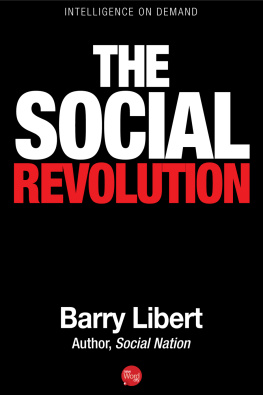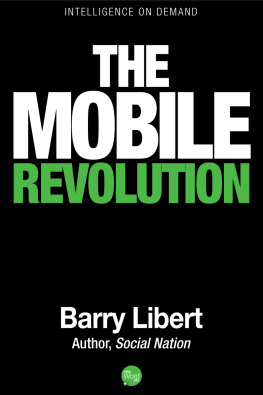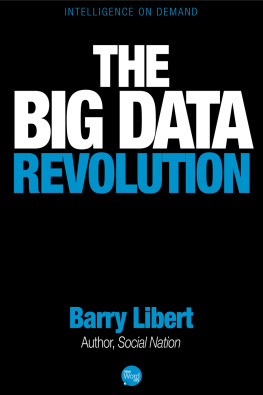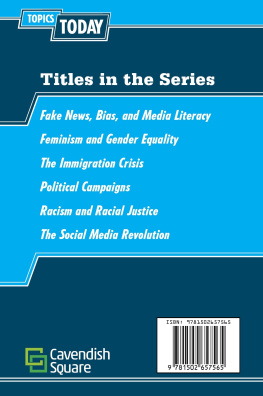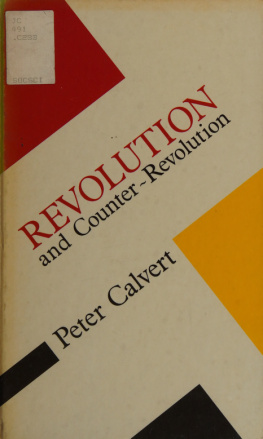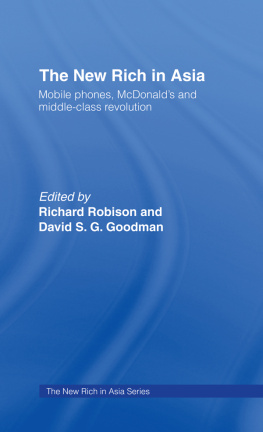Barry Libert - The Social Revolution
Here you can read online Barry Libert - The Social Revolution full text of the book (entire story) in english for free. Download pdf and epub, get meaning, cover and reviews about this ebook. year: 2013, publisher: New Word City, genre: Politics. Description of the work, (preface) as well as reviews are available. Best literature library LitArk.com created for fans of good reading and offers a wide selection of genres:
Romance novel
Science fiction
Adventure
Detective
Science
History
Home and family
Prose
Art
Politics
Computer
Non-fiction
Religion
Business
Children
Humor
Choose a favorite category and find really read worthwhile books. Enjoy immersion in the world of imagination, feel the emotions of the characters or learn something new for yourself, make an fascinating discovery.
- Book:The Social Revolution
- Author:
- Publisher:New Word City
- Genre:
- Year:2013
- Rating:3 / 5
- Favourites:Add to favourites
- Your mark:
- 60
- 1
- 2
- 3
- 4
- 5
The Social Revolution: summary, description and annotation
We offer to read an annotation, description, summary or preface (depends on what the author of the book "The Social Revolution" wrote himself). If you haven't found the necessary information about the book — write in the comments, we will try to find it.
The rebellion sweeping the Middle East is being powered by people using social media and mobile phones to unite and share their anger to force change. A remarkably similar revolution is beginning to happen to businesses around the world. Act now before it happens to yours.
The Social Revolution — read online for free the complete book (whole text) full work
Below is the text of the book, divided by pages. System saving the place of the last page read, allows you to conveniently read the book "The Social Revolution" online for free, without having to search again every time where you left off. Put a bookmark, and you can go to the page where you finished reading at any time.
Font size:
Interval:
Bookmark:
The rebellion that is upending the Middle East is about much more than a few autocratic regimes. It is a social media and mobile-technology revolution that has profound implications for governments and businesses all over the world. Thanks to Twitter, Facebook, YouTube, and smartphones, all of us who are fed up with top-down control are toppling the powers-that-be in a bid to take control ourselves - and I predict we will accomplish our goals.
As the events in Egypt and Tunisia have shown people can organize through social networks - and even when governments shut down the Internet, protesters can find ways to circumvent those (and other) defenses. What weve seen in Libya, Yemen, Iran, Syria, and even China is that brutal crackdowns lead to almost certain failure. But, in the end, social movements encourage the open expression of ideas and affirms the passions and desires of people leading to their ability to connect, revolt, and overturn those in power.
These lessons should not be lost on corporate leaders. I advise major global companies and government officials on how to cope with the new world of social media and mobile technology and have built and managed 15,000 on-line communities with 40 million users. In this brief e-book, I will share with you what Ive learned.
ONE MAN + SOCIAL MEDIA = COUP
The Arab rebellion began when a single man, Mohamed Bouazizi, a Tunisian fruit vendor, set himself afire to protest a series of injustices and humiliations at the hands of the regime of the longtime ruler, Zine el-Abidine Ben Ali. Bouazizi was not among the 15 percent, or 1.6 million of Tunisias population, who use the Internet. Nevertheless, social media in the form of Facebook quickly spread the news and images of his desperate act, thus inciting a spontaneous, leaderless protest. Activists coordinated the demonstrations on Facebook pages and with tweets, drawing little resistance from the regime. Ironically, Ben Ali, who feared a coup from within the ranks of his army and security forces, had so weakened the military as to make it impotent.
Within days, the peaceful throngs demanding Ben Alis departure achieved their goal - but not before mobs of demonstrators gathered in the Arab crescent from Algeria to Iran to express sympathy for the protesters in Tunisia while insisting on redress for their own grievances. Their forthright approach reflected the power of the second main facilitator of the Arab rebellion, the satellite cable networks of the BBC, CNN, Al Jazeera, and Al Arabiya. Without their courageous and credible reporting, the contagion of protest would have swept much less quickly to Egypt, Yemen, Oman, Bahrain, Iraq, Iran, Libya, and Syria.
Social media showcased the peoples technological ingenuity and adaptability in Egypt, where the continuance of Hosni Mubaraks 30-year reign hinged on his ability to persuade the army to keep him in power. After the first days of peaceful demonstrations in Cairos Tahrir Square, Mubarak cut off access to the Internet and sent in thugs armed with whips, clubs, and sabers to beat and intimidate the protesters. But the people fought back bravely and found ways to circumvent the Internet shutdown.
In a single weekend, Google and Twitter engineers devised a speak-to-tweet application that let the demonstrators phone in a voicemail, which automatically became a Twitter post. The technology enabled leaders of the protests to coordinate demonstrations around the country while keeping the world informed. When the army was dissuaded from opening fire on the Egyptian people in the square, Mubarak fled.
Social media continued to evolve over the 18-day span of the Egyptian upheaval as people came to understand its breathtaking power to topple the status quo and the leaders controlling it. Facebook, the most popular social destination by far at the outset of the demonstrations, was dismissed by leaders as something the kids used to communicate and interact. It was thought to have little relevance for businesses, governments, and leaders.
But a survey taken by Media Republic in the midst of the chaos showed that 53 percent of respondents were now checking Twitter ahead of Facebook, presumably using mobile devices. The marketing firm found that 66 percent were using Twitter to look for bulletins posted by news Web sites instead of accessing the sites themselves. For the first time, protesters could get real-time, on-scene reports and video showing, for instance, where tear gas was being used, thus allowing them to move to safer ground.
What is more, kids werent the only ones tweeting on mobile devices. Adults who had something to say were using Twitter to get their messages out. The social revolution that started and grew as a place to connect with friends had taken on even greater and more profound significance as a platform for revolt.
The next major clash came in Libya. It was more difficult to organize protests in a desert state that New York Times columnist Thomas Friedman describes as a tribe with flags as opposed to a nation like Egypt, which has an ancient civilization and strong national identity. Perhaps more important to a social revolution, fewer than 6 percent of the 6.5 million Libyans are Internet users, and only half visit Facebook.
But expatriate Libyans who had migrated to other parts of the world were galvanized by the events in Egypt. Copying the January 25 Day of Rage that sparked the Egyptian movement, they set February 17 as Libyas Day of Rage and created Facebook pages and Web sites, such as Feb17.info and Libyafeb17.com, and a Twitter feed called Feb 17 Voices to publicize events and organize support.
As the protest grew, the number of Facebook and Twitter users in Libya rose dramatically. Google set up a speak-to-tweet service for Libya, too, and Libyans used Web-radio technology to create Free Benghazi Radio. A Twitter user named Arasmus assembled a mash-up map of Libya showing the location of anonymous tweeters. Users could click on icons for each region and get information about police activity and protests.
Jubilant demonstrators were joined by sympathizers around the world, while fearful governments in Iraq, Iran, Jordan, Oman, Syria, and Yemen nervously followed the battle.
Outside of a handful of protesters who were arrested, dissent in Saudi Arabia has been held in check by King Abdullahs promise of higher wages and more jobs for the 14 million or so Saudis under the age of 30. But when turmoil in neighboring Bahrain appeared to be getting out of hand, Saudi and United Arab Emirates soldiers rolled in to restore order. Nevertheless, fears that the worlds biggest crude-oil producer might be forced to limit production sent global prices spiraling upward.
In China, too, leaders were clearly shaken by the spectacle of peaceful, unarmed protesters toppling autocratic regimes. By some estimates, China has quelled hundreds of thousands of mini-riots in recent years as the populace vents its anger over legal injustices, environmental threats, income inequality, and government repression of civil rights.
Thus far, economic growth and rising prosperity for the lucky ones have kept Chinese rage in check. But if protests around the vast country could be coordinated, the regime might be in danger. Given the cracks that have occurred in Chinas electronically powered Great Firewall during the Arab rebellion, allowing news of the protests to reach Chinese citizens, the authorities may have reason to worry. And recently, a call via social media for protest in China itself found an audience.
No wonder security forces have lately been sent into cities around the country to lock down public squares and shopping malls. Foreign reporters have been detained, harassed, and in at least one instance, a journalist was severely beaten. Equipment has been confiscated and digital pictures forcibly erased.
Font size:
Interval:
Bookmark:
Similar books «The Social Revolution»
Look at similar books to The Social Revolution. We have selected literature similar in name and meaning in the hope of providing readers with more options to find new, interesting, not yet read works.
Discussion, reviews of the book The Social Revolution and just readers' own opinions. Leave your comments, write what you think about the work, its meaning or the main characters. Specify what exactly you liked and what you didn't like, and why you think so.

